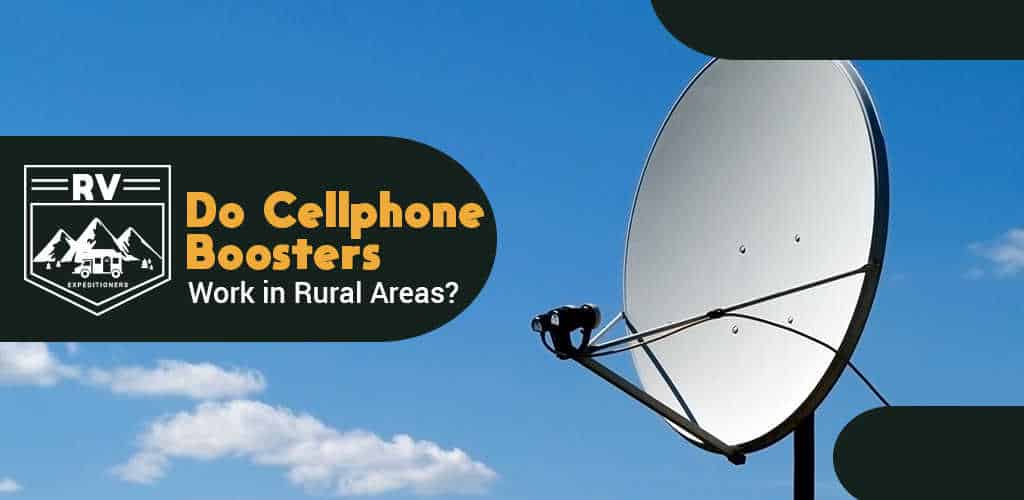A lot of people are skeptical about the effectiveness of cellphone boosters. Do cellphone boosters work in rural areas or are they best suited when traveling between towns?
Cellphone boosters do work. But, their effectiveness often depends on the conditions in your area, just as much as they depend on the quality of the gadget. Have a look at how cellphone boosters are built, how they work, and how you should value them or pick them for personal use.
How Cellphone Boosters Work
The concept is simple. A signal booster picks up a weak signal, enhances or boosts it, and then rebroadcasts it in an area around it. Most signal boosters feature three major components:
Outside antenna – for capturing weak cell signals
Usually, omnidirectional antennas are preferred. They pull in a 360-degree signal and are more versatile. However, a unidirectional antenna has a narrower field of vision and a longer reach. It’s a must-have if the signal is abysmal.
Amplifier – to boost the signal
Inside antenna – to rebroadcast the signal
Inside antennas can be placed on the dashboard in your cab area or on the ceiling of your RV (or home). Doing so gives a better rebroadcast signal spread. However, you can mount an inside antenna on a wall if you want to focus the signal in a specific direction.
There are two types of inside antenna: panel and dome antennas. Although only the latter is intended for a ceiling-mounted booster setup, with a bit of skill you can mount either type wherever you want in the RV.
Buying Tips
When it comes to buying a signal booster, there are two things to consider. Number one, you look at the dB output. That will tell you how powerful the amplifier is and if it will work in your area.
The second thing to look at is the coverage. The amplifiers can cover areas of 500-7,000 sq. ft. Therefore, unless you’re using the amplifier for a fixed location, more coverage is always better. If you’re always on the move and you need a cellphone booster for your RV, you can make do with coverage in the immediate vicinity, which will also save you a few bucks.
Valuing Cellphone Boosters by Amplifier Specifications
As a general rule of thumb, cellphone boosters for vehicles (including RVs) are rated at 25 to 50 dB. Home signal boosters may go up to 60 or 70 dB. Now how does this all come together?
Most phones use bars as a visual indicator for signal strength. The signal is actually measured in dB or decibel. Cellphone signals are usually between -50dB and -120dB. With -50dB indicating full bars and -120dB no signal or very weak signal.
So, when looking at amplifiers, it’s worth knowing the signal strength that you’re getting in a rural area. Some phones do this, and some don’t. But the idea is to get a cellphone booster with enough dB to get you as close as possible to the -50dB value.
Tower Distance, Obstacles, and Other Impediments
When traveling to or passing through a rural area, it’s best to check the carrier coverage first. You can check the coverage map and strength for your carrier online. It might make sense to check the coverage of your traveling companions’ carriers as well.
Certain carriers may share cell towers, so keep that in mind. Even AT&T and Verizon are working on shared tower projects together.
There are many things that interfere and weaken the signal, starting with the distance from the cell tower. The further away you find yourself from a cell tower, the weaker the signal.
A cellphone booster should give you an edge. But while a booster may be enough to solve the distance problem, there are other things between you and the tower – obstacles.
Obstacles can be anything from hills, mountains, to buildings, or even the materials used in your van or new home. If the terrain doesn’t seem to make much of a difference, test the signal strength inside and outside and even a few feet away from your home or car.
This way you’ll know if the materials are interfering.What are Some of the Benefits and Drawbacks of Using Cellphone Boosters?
The pros should be obvious. Using a signal booster can prevent slow texting, bad call quality, dropped calls, inconsistent reception, and everything related. But keep in mind that cellphone boosters will only improve poor 3G or 4G signals, they won’t make it perfect.
Another major upside is that today’s cellphone boosters work with all cellphones and any providers. There are very few carrier-specific boosters on the market, which means that once you buy one, you’re future-proof.
The only real con of using one would be the cost. If you’re in a so-called cell signal dead zone in the mountains, you may have to buy a very expensive signal booster to be able to use your phone.
Finally, there are still rural residents in America who complain about absolutely no cell coverage. Boosters aren’t likely to work in such places or people would’ve gotten boosters and stopped complaining.
FAQ'S
Does a cell phone signal booster work for camping?
Depending on your definition of camping. The answer is yes, a booster will help the signal at a campground, inside a building with electricity. It won't work if you are outside without access to an outlet, or if you need a boost outside without access to an outlet.
Does a cell phone booster work for mountains?
Certainly. Unless you're on something like Mount Everest, a cell phone booster will pull in a signal if it can reach the mountain or close enough to it.

